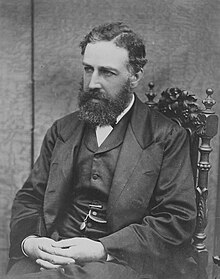
Back وليم ستانلي جيفونز Arabic وليم ستانلى جيفونز ARZ Vilyam Stenli Cevons Azerbaijani ویلیام استنلی جونز AZB Уилям Стенли Джевънс Bulgarian William Stanley Jevons Catalan William Stanley Jevons Czech William Stanley Jevons Danish William Stanley Jevons German William Stanley Jevons Esperanto
William Stanley Jevons | |
|---|---|
 | |
| Born | 1 September 1835 Liverpool, Lancashire, England |
| Died | 13 August 1882 (aged 46) Bexhill-on-Sea, Sussex, England |
| Alma mater | University College London |
| Known for | Marginal utility theory Jevons paradox |
| Children | Herbert Stanley Jevons |
| Scientific career | |
| Fields | Economics Logic |
| Institutions | University College London (1876–1880) Owens College (now University of Manchester) (1863–1875) |
| Academic advisors | Augustus De Morgan |
| Signature | |
| Notes | |
While not a formal advisor (Jevons lived before the introduction of the PhD to Britain), De Morgan was his most influential professor.[1] | |
William Stanley Jevons FRS (/ˈdʒɛvənz/;[2] 1 September 1835 – 13 August 1882) was an English economist and logician.
Irving Fisher described Jevons's book A General Mathematical Theory of Political Economy (1862) as the start of the mathematical method in economics.[3] It made the case that economics, as a science concerned with quantities, is necessarily mathematical.[4] In so doing, it expounded upon the "final" (marginal) utility theory of value. Jevons' work, along with similar discoveries made by Carl Menger in Vienna (1871) and by Léon Walras in Switzerland (1874), marked the opening of a new period in the history of economic thought. Jevons's contribution to the marginal revolution in economics in the late 19th century established his reputation as a leading political economist and logician of the time.
Jevons broke off his studies of the natural sciences in London in 1854 to work as an assayer in Sydney, where he acquired an interest in political economy. Returning to the UK in 1859, he published General Mathematical Theory of Political Economy in 1862, outlining the marginal utility theory of value, and A Serious Fall in the Value of Gold in 1863. For Jevons, the utility or value to a consumer of an additional unit of a product is inversely related to the number of units of that product he already owns, at least beyond some critical quantity.
Jevons received public recognition for his work on The Coal Question (1865), in which he called attention to the gradual exhaustion of Britain's coal supplies and also put forth the view that increases in energy production efficiency leads to more, not less, consumption.[5]: 7f, 161f This view is known today as the Jevons paradox, named after him. Due to this particular work, Jevons is regarded today as the first economist of some standing to develop an 'ecological' perspective on the economy.[6]: 295f [7]: 147 [5]: 2
The most important of his works on logic and scientific methods is his Principles of Science (1874),[8] as well as The Theory of Political Economy (1871) and The State in Relation to Labour (1882). Among his inventions was the logic piano, a mechanical computer.
- ^ R. D. Collison Black (1972). "Jevons, Bentham and De Morgan", Economica, New Series, Vol. 39, No. 154, pp. 119–34.
- ^ Daniel Jones, Everyman's English Pronouncing Dictionary (Dent, Dutton: 13th ed., 1967), p. 266.
- ^ Irving Fisher, 1892. Mathematical Investigations in the Theory of Value and Prices, Appendix III, "The Utility and History of Mathematical Method in Economics", p. 109.
- ^ W. Stanley Jevons, 1871.The Principles of Political Economy, p. 4.
- ^ a b Martínez-Alier, Juan (1987). Ecological Economics: Energy, Environment and Society. Oxford: Basil Blackwell. ISBN 978-0631171461.
- ^ Georgescu-Roegen, Nicholas (1971). The Entropy Law and the Economic Process (Full book accessible at Scribd). Cambridge, Massachusetts: Harvard University Press. ISBN 978-0674257801.
- ^ Boulding, Kenneth E. (1981). Evolutionary Economics. Beverly Hills: Sage Publications. ISBN 978-0803916487.
- ^ Jevons, William Stanley, The Principles of Science: A Treatise on Logic and Scientific Method, Macmillan & Co., London, 1874, 2nd ed. 1877, 3rd ed. 1879. Reprinted with a foreword by Ernst Nagel, Dover Publications, New York, 1958.